必修4课件:Unit5 Theme parks Learning about language课件(共57张PPT)
文档属性
| 名称 | 必修4课件:Unit5 Theme parks Learning about language课件(共57张PPT) | 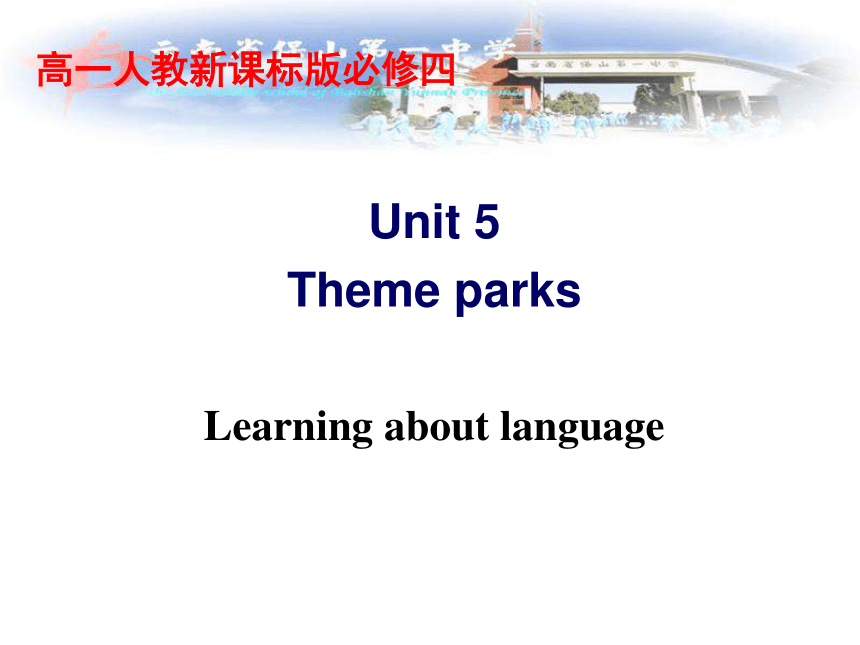 | |
| 格式 | zip | ||
| 文件大小 | 1.6MB | ||
| 资源类型 | 教案 | ||
| 版本资源 | 人教版(新课程标准) | ||
| 科目 | 英语 | ||
| 更新时间 | 2018-12-25 17:28:32 | ||
图片预览


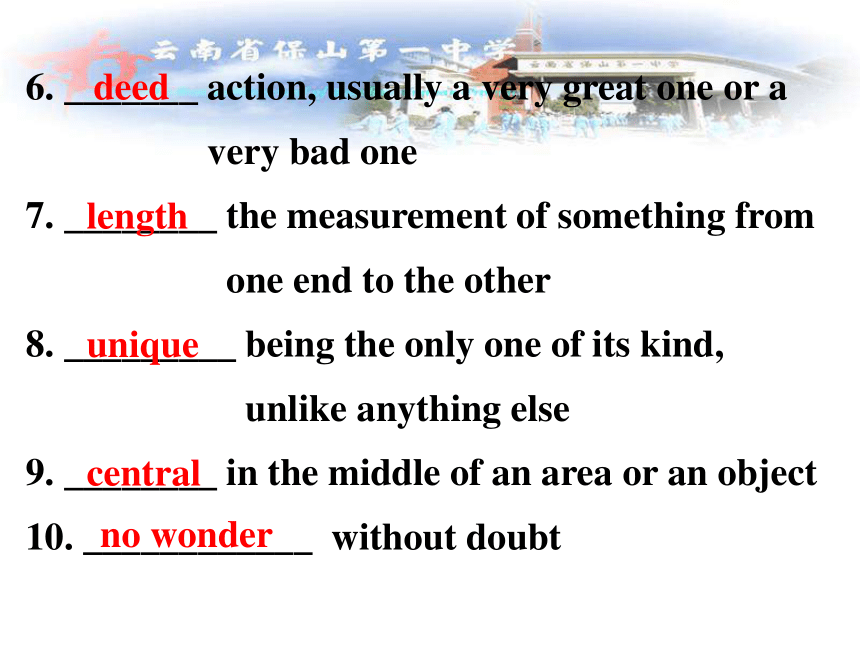
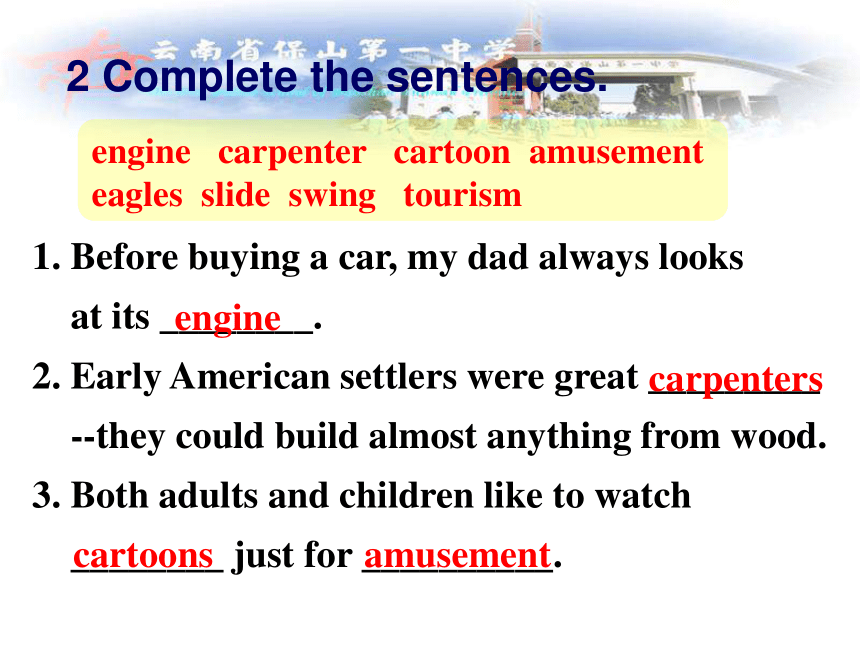
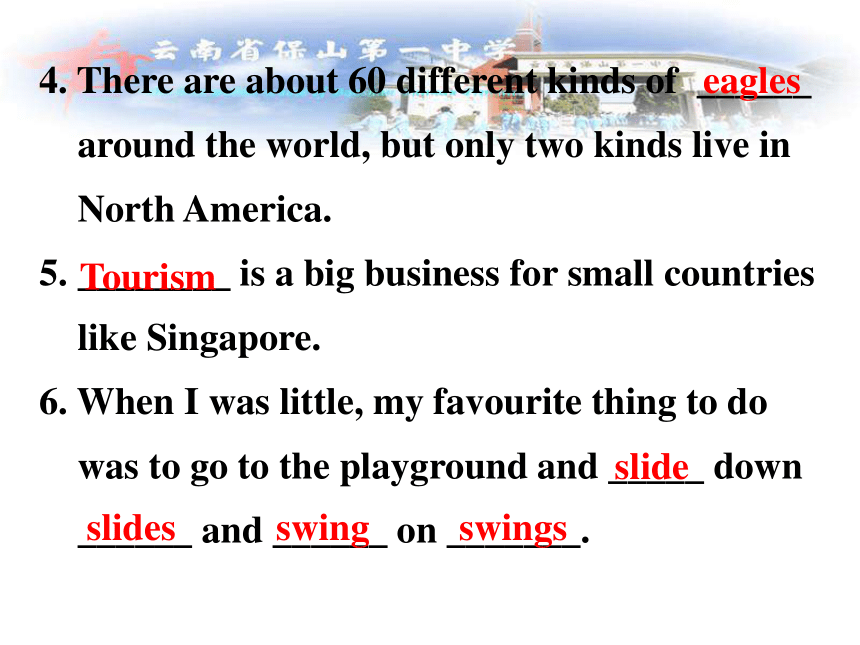
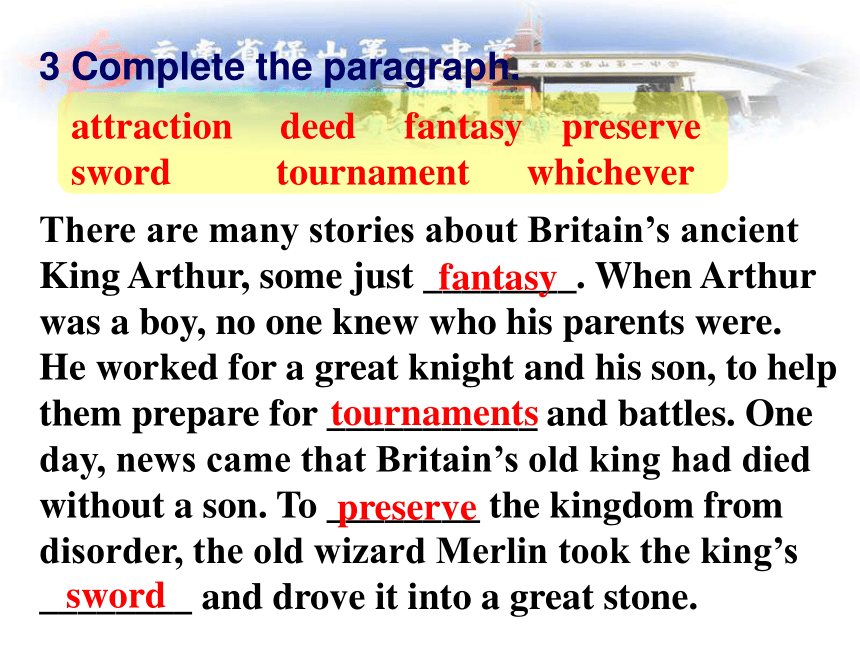
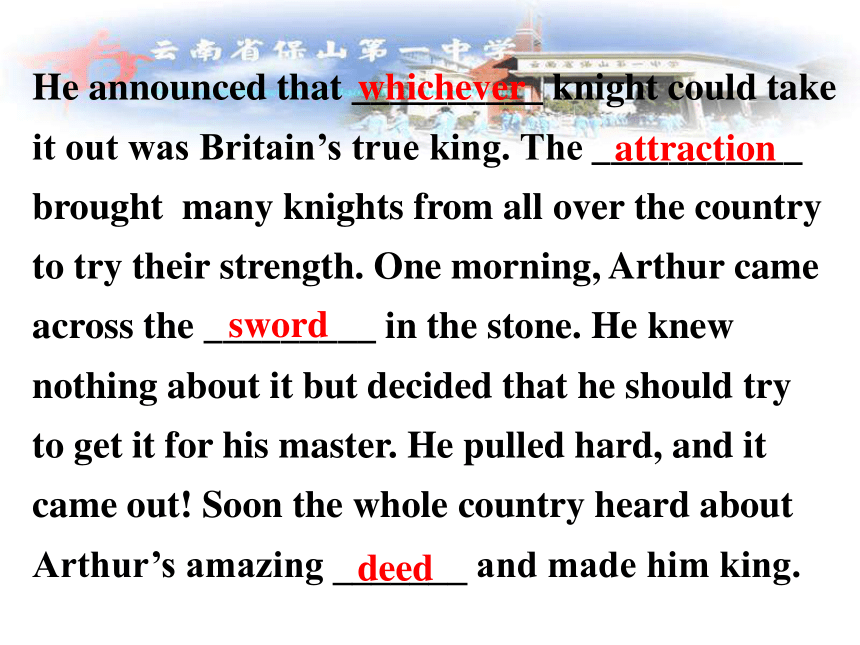
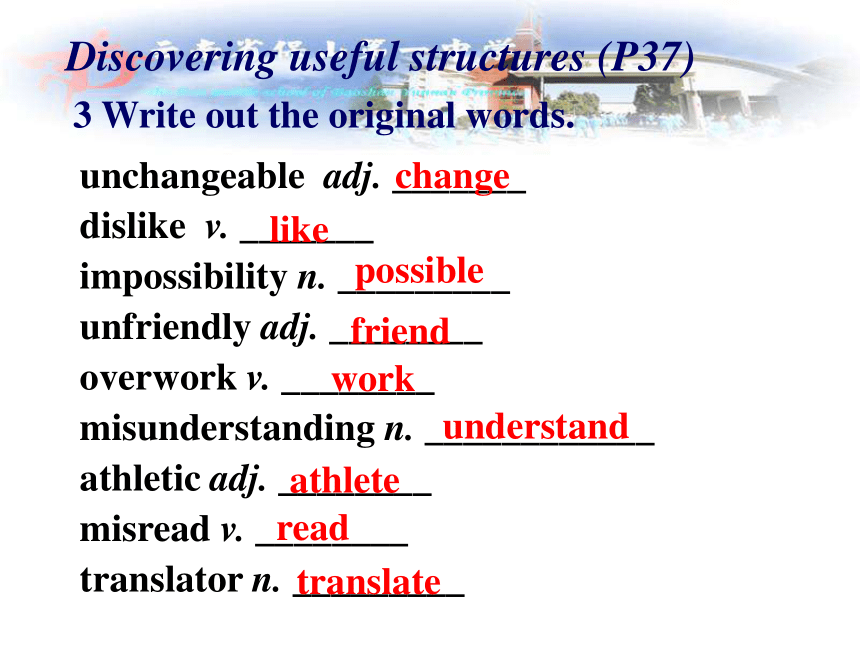
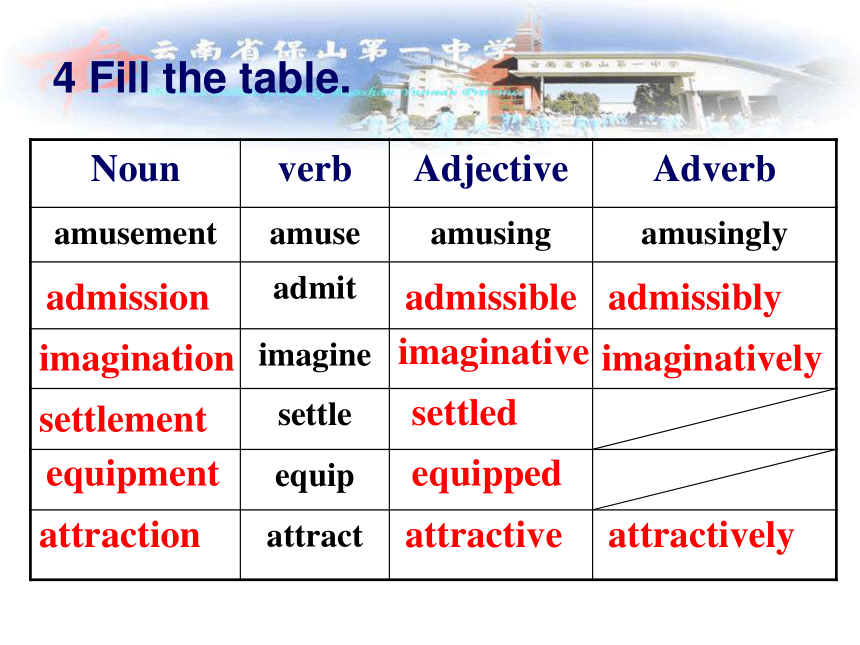
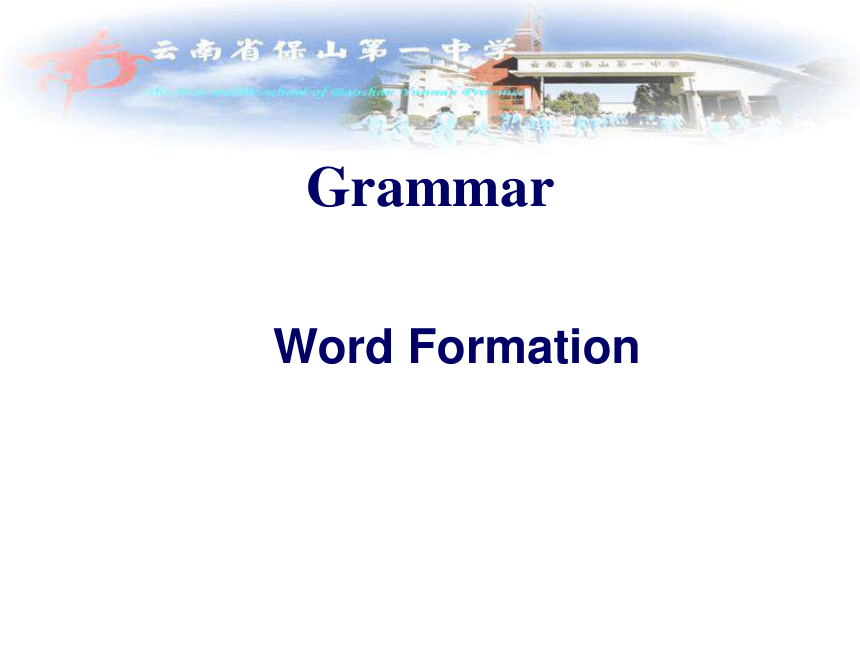
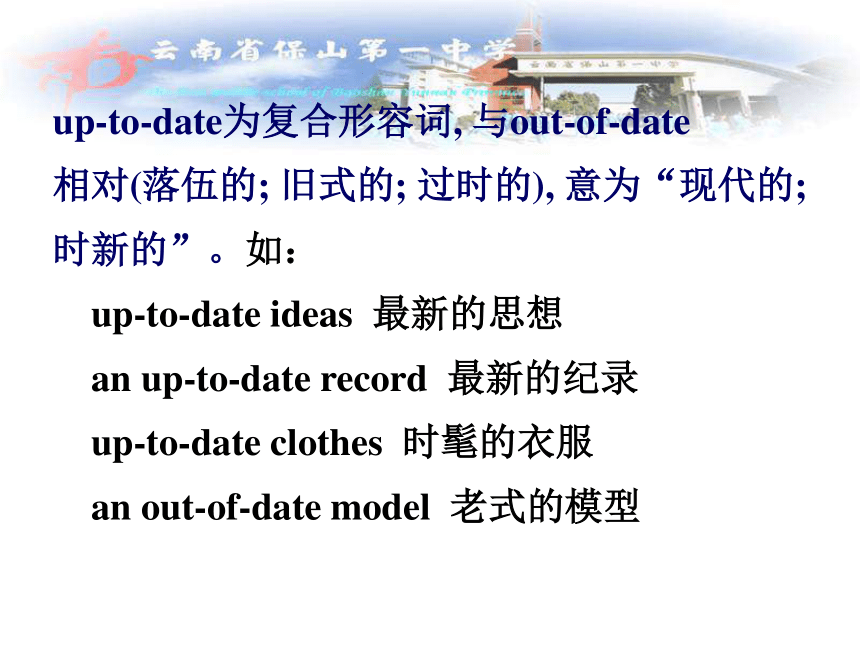
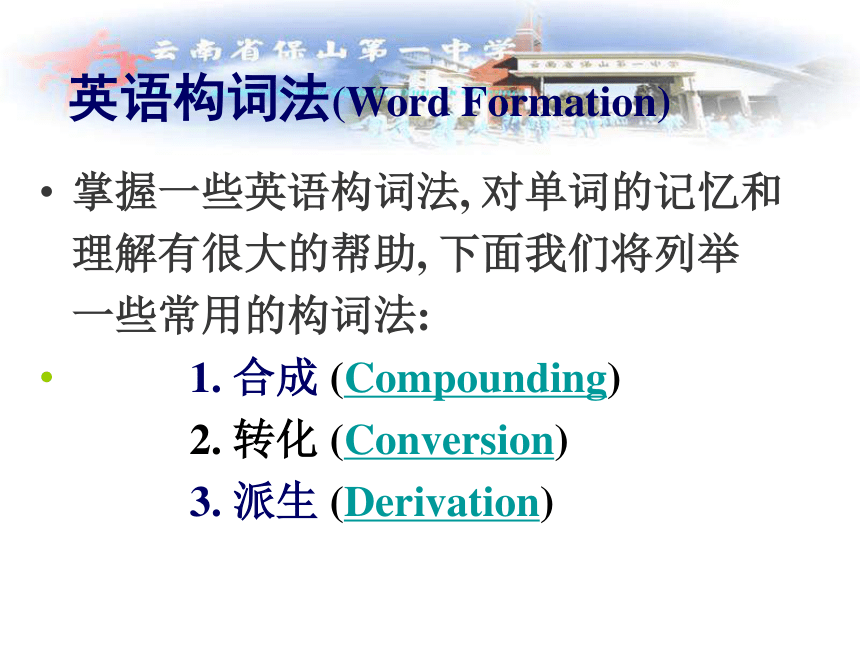
文档简介
Unit 5
Theme parks
Learning about language
高一人教新课标版必修四
1 Find the word from the text.
1. _________ several different types of
2. _________ the main subject of a talk, book,
film or something else
3. _________ to keep something as it is; an area
of land made available for a special group
of people or animals to live in
4. __________ to or at any place, position or
situation
5. _________ something that is pleasant to think
about but is not real
various
theme
preserve
wherever
fantasy
6. _______ action, usually a very great one or a
very bad one
7. ________ the measurement of something from
one end to the other
8. _________ being the only one of its kind,
unlike anything else
9. ________ in the middle of an area or an object
10. ____________ without doubt
deed
length
unique
central
no wonder
engine carpenter cartoon amusement
eagles slide swing tourism
1. Before buying a car, my dad always looks
at its ________.
2. Early American settlers were great _________
--they could build almost anything from wood.
3. Both adults and children like to watch
________ just for __________.
engine
carpenters
cartoons
amusement
2 Complete the sentences.
4. There are about 60 different kinds of ______
around the world, but only two kinds live in
North America.
5. ________ is a big business for small countries
like Singapore.
6. When I was little, my favourite thing to do
was to go to the playground and _____ down
______ and ______ on _______.
eagles
Tourism
slide
slides
swing
swings
There are many stories about Britain’s ancient
King Arthur, some just ________. When Arthur
was a boy, no one knew who his parents were.
He worked for a great knight and his son, to help
them prepare for ___________ and battles. One
day, news came that Britain’s old king had died
without a son. To ________ the kingdom from
disorder, the old wizard Merlin took the king’s
________ and drove it into a great stone.
attraction deed fantasy preserve
sword tournament whichever
fantasy
tournaments
preserve
3 Complete the paragraph.
sword
He announced that __________ knight could take
it out was Britain’s true king. The ___________
brought many knights from all over the country
to try their strength. One morning, Arthur came
across the _________ in the stone. He knew
nothing about it but decided that he should try
to get it for his master. He pulled hard, and it
came out! Soon the whole country heard about
Arthur’s amazing _______ and made him king.
sword
deed
attraction
whichever
3 Write out the original words.
unchangeable adj. _______
dislike v. _______
impossibility n. _________
unfriendly adj. ________
overwork v. ________
misunderstanding n. ____________
athletic adj. ________
misread v. ________
translator n. _________
change
like
possible
friend
work
understand
athlete
read
translate
Discovering useful structures (P37)
4 Fill the table.
admission
admissible
admissibly
imagination
imaginative
imaginatively
settlement
settled
equipment
equipped
attraction
attractive
attractively
Noun verb Adjective Adverb
amusement amuse amusing amusingly
admit
imagine
settle
equip
attract
Word Formation
Grammar
up-to-date为复合形容词, 与out-of-date
相对(落伍的; 旧式的; 过时的), 意为“现代的;
时新的”。如:
up-to-date ideas 最新的思想
an up-to-date record 最新的纪录
up-to-date clothes 时髦的衣服
an out-of-date model 老式的模型
掌握一些英语构词法, 对单词的记忆和
理解有很大的帮助, 下面我们将列举
一些常用的构词法:
1. 合成 (Compounding)
2. 转化 (Conversion)
3. 派生 (Derivation)
英语构词法(Word Formation)
1. 合成(Compounding)
由两个或更多的词合成一个词, 有的用
连字符号“-”连接,有的直接连写在一起。
e.g. wood (木)+cut (刻)=woodcut (木刻)
man (人)+kind (种类)=mankind (人类)
air (空气, 空中)+sick (恶心的, 晕的)
=airsick (晕机的)
merry-go-round 旋转木马
up-to-date 最新的
life-size 与真人一般大
复合形容词的构成
方式 例 词
形容词+形容词 red-hot, bitter-sweet,
形容词+名词 first-class, full-time,
形容词+现在分词 good-looking,
形容词+过去分词 ready-made
形容词+名词-ed good-tempered,
名词+名词-ed iron-willed
名词+形容词 world-famous,
名词+现在分词 beauty-loving,
复合形容词的构成
方式 例 词
名词+过去分词 man-made,
副词+形容词 ever-green,
副词+现在分词 hard-working,
副词+过去分词 well-prepared,
数词+名词 five-year,
数词+名词+形容词 five-year-old,
数词+名词-ed four-legged,
复合名词的构成
方式 例词
名词+名词 horseback , bank-note,
形容词+名词 back-yard, forehead,
动名词+名词 hiding-place, reading-room
动词+副词 get-off, break-in, breakdown,
副词+动词 output, overflow
动词+名词 pickpocket , break-water
副词+名词 overcoat, inland
代词+名词 he-goat, she-wolf
名词+介词+名词 editor-in-chief, father-in-law
其他复合词的构成
方式 例 词
复合动词 名词+动词 day-dream,
sun-bathe
副词+动词 overcome, upturn,
形容词+动词 white-wash
复合副词 名词+名词 sideways
名词+副词 headfirst
形容词+名词 meanwhile
介词+名词 beforehand
其他复合词的构成
方式 例 词
复合代词 代词宾格或物主代词 + self (selves) himself, ourselves
某些不定代词 + body (one, thing) everyone (everybody, everything), nobody (no one, nothing)
2. 转化 (conversion)
由一种词类转换成另一种词类。(即一
般拼写不变, 但是词类发生了变化,
有时发音也变化)
e.g. water n. 水 ---- water v. 浇水
dirty adj. 脏的---- dirty v. 弄脏
e.g. He went in and sat down.
The army downed a plane.
转化法举例
名词转化为动词 形容词转化为动词 名词转化为形容词 副词转换为动词
telephone
电话→打电话 slow 慢的→放慢 front前面→前面的 down 向下→击倒
hand手 → 交给 warm 暖的→使温暖 black 黑色→黑色的 back向后→后退
record 录音→记录 empty 空的→倒空 noble 贵族→高贵的 up 向上→提高
date 日期→ 定日期 better 较好→ 改善 key 钥匙 →关键的
name 名字→ 命名 cool 凉爽 →使冷
face 脸 →
面对
动词转化为名词 动词转化为形容词 形容词转化为名词 一些形容词前加the后转换为名词
drink 喝→饮料 perfect
使完善→完美的 chief 主要的→首领 the wounded
受伤的人们
study 学习→书房 fit 适合 → 适合的 first 第一的 → 第一个 the blind盲人们
look at → have a look at wrong 错误的 → 错 误 the beautiful
美丽的东西
3. 派生(Derivation)
由一个词根加上前缀或后缀构成
另一个词.
1)后缀(suffix)
①名词后缀
-or actor sailor
-ist scientist
-ment achievement movement
-(a)tion preparation exception
-y difficulty discovery
②形容词后缀
-ful useful cheerful
-able comfortable enjoyable
-ed manned cultured
-less careless fearless
-ive active decisive
-an European Indian
③动词后缀
-ize realize modernize
-en widen strengthen
④副词后缀
-ly really extremely
-ward backward eastward
⑤数词后缀
-teen fourteen fifteen
-ty forty fifty
-th ninth twelfth
表示人和物的名词后缀
后缀 意 义 用 法 例词
表
示
人
er 从事…职业的人,做…的人,…地方的人 加在动词、名词、形容词上 teacher, worker
learner,
or 与-er同义 外来后缀,加在外来词上 visitor, educator
eer 从事于...的人 用于外来词 engineer, mountaineer
后缀 意 义 用 法 例词
表示人 -ess 女……的 加于名词后,表示阴性 actress, waitress
-ician ……(专)家, 加在以-ic结尾的名词或形容词上 physician, politician
musician
-ist 从事……职业的人,从事某种……文艺、学术的人 加在名词上,或 –ize 结尾的动词上,或以-al结尾的其它词上 artist, socialist
表示物 -er 表示从事某工作的物 加在动词和名词或复合词上 washer, fiver
-or 表示从事某工作的物 加在动词上 receptor
后缀-er 构词能力
用 法 例 词
表示“人”, 加在动词上 listener, adviser, speaker, writer, turner, driver, teacher, worker, singer
表示“人”, 加在名词上 banker, hatter, officer, lawyer, prisoner
表示“人”, 加在某些地点名词或某些形容词 Londoner, New Yorker, villager, Britisher, southerner, foreigner
表示“人”, 加在复合词上 housekeeper, bookseller, looker-on, theatre-goer
后缀-er 构词能力
用 法 例 词
表示“物”, 加在动词上 washer, boiler, container, lighter, drawer
表示“物”,加在名词上 steamer, washer, creeper
表示“物”, 加在复合词上 three-wheeler, loudspeaker
既表示 “人”也表示“物”, 加在动词上 fighter, printer, recorder, ruler
抽象名词和集合名词的后缀
后缀 意义 例词
-age 表示行为(结果)、
状态/总称/费用 storage, package, postage, marriage
-ure 表示行为、
其过程或结果 failure, temperature, pressure, pleasure,
-ity 表示性质
状态/ 程度 majority, opportunity, infinity
-ment 表示行为/ 动作
结果/ 具体事物 argument, statement, achievement
-ion 表示行为/ 过程
状态/ 情况/ 性质 action, protection
后缀 意义 例词
-ism 表示制度/ 主义
学说/ 行为, communism, criticism,
-y 表示境遇、性质,营业,全体, 行为 difficulty, beggary, discovery
-al 表示动作、行为 arrival, refusal, disapproval,
-ness 表示性质、状态、
程度 kindness, illness, brightness,
-ship 表示身份、职业、
性质、 citizenship, friendship, hardship,
后缀 意义 例词
-hood 表示身份、亲属
关系、性质 childhood, brotherhood
-ance 表示动作或性质 appearance, entrance
-th 表示动作、度量、
性质、状态 strength, growth, length
-dom 表示地位、领域、
集体、状态、性质 kingdom, filmdom, wisdom
后缀为-ion的名词
规 则 例词
几乎所有以-ate结尾的动词在变为名词时首先去掉e再加-ion. educate/education, liberate/liberation, translate/translation,
多数以-t结尾的动词直接在词尾加-ion,少数以-te结尾的动词首先去掉e再加-ion. act/action, invent/invention, inspect/inspection, select/selection,
多数以-ss结尾的动词直接加-ion. discuss/discussion, oppress/oppression,
规 则 例 词
多数以-de结尾与少数以-d结尾的动词先把-de或-d变成-s再加-ion. decide/decision, divide/division, provide/provision,
以-mit结尾的动词,先把t变成-ss,再加-ion. admit/admission, commit/commission,
规 则 例 词
多数以-fy结尾的动词先把y改成i再加-cation,少数以-efy或-fy结尾的动词先去掉y再加action. satisfy/satisfaction, modify/ modification,
有些动词不是加-ion,而是加-ition, -tion, -ation或-sion而变成名词,其中有些词根因读音关系而发生了变化。 add/addition, attend/attention, absorb/absorption, describe/ description,
形容词后缀
后缀 意 义 例 词
-able 可/能……的 valuable, horrible,
-al 有……性质的 natural,
-ant, -ent ……的 important, pleasant,
-ic, -ical ……性质的,与……有关的 atomic, electric,
后缀 意 义 例 词
-ish 稍带……的, ……气的,
……民族的, ……语的 feverish, childish, bookish
English,
-ed 有……的, 有……特征的 tired, interested,
-en 由……构(制)成的 wooden, earthen,
-ive 有……倾向的/性质的 instructive, expensive
后缀 意 义 例 词
-ful 充满……的, 引起…… 的 thankful, powerful, tearful
-less 无/不……的不能……的 homeless, harmless,
-ous 充满……的, 有……特性的 famous, nervous
-ly 有……性质的, ……形状的 yearly, daily, orderly
-y 有/多……的, 想……的 cloudy, sunny,
副词后缀
后缀 用法及意义 例词
-ward
-wards 加在名词或副词后,表示“向……的” forward, backward, upward,
downward, toward, northward, afterward
后缀 用法及意义 例词
-ly 加在形容词之后 表示某种状态 cheerfully, slightly, simply,
表示某个方面 economically,
表示程度或范围 greatly,
表示时间 recently,
表示次序 firstly, secondly
表示方向 eastwardly,
动 词 后 缀
后缀 意 义 例 词
-ate 使成为, 成为……, 处理, 使化合 educate, translate, imitate,
calculate, operate,
-en 变为, 使为, 变为有, 使有 darken, weaken, deepen, sharpen, glisten, frighten, strengthen
后缀 意 义 例 词
-fy 使成为,使……化 beautify, uglify, satisfy, terrify, electrify, purify
-ish 使……,
令…… finish, accomplish, punish, furnish, publish,
-ize
-ize 使成,
变成, modernize, democratize, revolutionize, realize,
2)前缀(prefix) 一般不造成词类的转变, 只是引起意思的变化
e.g. un-(不, 或做相反动作)
unhappy undo
im-(不) impossible impolite
re-(重新) retell rewrite
mis-(错误的) misunderstand
个别前缀会引起词类的变化
e.g. en-(使得…) endanger enlarge
a- asleep awake
前 缀 意 义 用 法 例词
un- 不, 未
(= not) 加在形容词或副词前 unhappy, unnecessary, untouched,
相反动作 加在动词前 uncover, untie, unwrap, unlock
前 缀 意 义 用 法 例 词
mis- 表示错、误 加在名词、动词或及其派生词前 mistake, misfortune,
misread
in- ,il-
im-,ir- 不, 非, 无 加在形容词或其派生的名词或副词前 inattentive, impossible. impolite, irregular,
前 缀 意义 用 法 例词
dis- 表示否定 加在名词或形容词前 dishonour, disease
表示相反 加在动词前 dislike, disbelieve
表示分离
剥夺除去 加在名词或动词前 discharge, dismiss
1)??a- 表示“在……之上”,“向……”
aboard, aside,
2)? by- 表示“附近,邻近,边侧”
bypath, bypass(弯路)
3)? circum-, circu-, 表示“周围,环绕,
回转” ,circumstance, circuit
4)? de-, 表示“在下,向下”
descend, degrade
表示空间位置, 方向关系的前缀
5)?en-, 表示“在内, 进入” encage,
6)?ex-, ec-, es-, 表示“外部,外”
exit, eclipse, expand, export
7)?extra-, 表示“额外”extraction (提取)
8)?fore- 表示“在前面”
forehead, foreground
9)?in-, il-, im-, ir-, 表示“向内,在内,
背于” inland, invade, inside, import
10) inter-, intel-, 表示“在……间, 相
互” international, interaction
11) intro-, 表示“向内,在内, 内侧”
introduce, introduce
12) medi-, med-, mid-, 表示“中, 中间”
Mediterranean, midposition
13) out-, 表示“在上面,在外部, 在外”
outline, outside, outward
14) over-, 表示“在上面, 在外部,
向上” overlook, overhead,
15) post-, 表示“向后, 在后边, 次”
postscript(附言),
16) pre-, 表示“在前”在前面”
prefix, preface, preposition
17) pro-, 表示“在前, 向前”
progress, proceed,
18) sub-, suc-, suf-, sug-, sum-, sup-,
sur-, sus-, 表示“在下面, 下”
subway, submarine, suffix, suppress,
supplement
19) super-, sur-, 表示“在……之上”
superficial, surface,
20) trans-, 表示“移上, 转上,
在那一边” translate, transform,
21) under-, 表示“在……下面, 下的”
underline, underground
22) up-, 表示“向上, 向上面, 在上”
upward, uphold, uphill(上坡)
简略词
合成词
缩略词
指缩写词
exam—examination
plane — aeroplane
ad.—advertisement
maths — mathematics
把两个词某部
分联合起来合
成为一个新词
smoke + fog = smog
motor +hotel=motel
指首字母
缩略词
TV— television
TOEFL — Test of English
As A Foreign Language
1. Make compound words after the models.
A: part, long, passer, film, short, well,
cold, baby, get, low, world
B: by, known, time, maker, wave,
famous, sitter, term, together,
lying, blooded
Model: part + time = part-time
练一练
2. Fill in the blanks with the words above.
1) It’s a good idea to start a _________ job
to make extra money.
2) It’s necessary to use a __________
radio to pick up the program.
3) Walt Disney, the great __________,
was born in Chicago in 1901.
part-time
short-wave
film-maker
4) The Dead Sea is very _________, at
around 395 meters below sea level.
5) We’re having a little ___________ to
celebrate his birthday.
6) They often perform in the streets for
the _________.
7) I’m sure you will be __________ soon.
low-lying
get-together
passers-by
well-known
For more exercises, click here.
Homework
1. Remember the rules of word
formation.
2. Do exercises on page 70-71.
Theme parks
Learning about language
高一人教新课标版必修四
1 Find the word from the text.
1. _________ several different types of
2. _________ the main subject of a talk, book,
film or something else
3. _________ to keep something as it is; an area
of land made available for a special group
of people or animals to live in
4. __________ to or at any place, position or
situation
5. _________ something that is pleasant to think
about but is not real
various
theme
preserve
wherever
fantasy
6. _______ action, usually a very great one or a
very bad one
7. ________ the measurement of something from
one end to the other
8. _________ being the only one of its kind,
unlike anything else
9. ________ in the middle of an area or an object
10. ____________ without doubt
deed
length
unique
central
no wonder
engine carpenter cartoon amusement
eagles slide swing tourism
1. Before buying a car, my dad always looks
at its ________.
2. Early American settlers were great _________
--they could build almost anything from wood.
3. Both adults and children like to watch
________ just for __________.
engine
carpenters
cartoons
amusement
2 Complete the sentences.
4. There are about 60 different kinds of ______
around the world, but only two kinds live in
North America.
5. ________ is a big business for small countries
like Singapore.
6. When I was little, my favourite thing to do
was to go to the playground and _____ down
______ and ______ on _______.
eagles
Tourism
slide
slides
swing
swings
There are many stories about Britain’s ancient
King Arthur, some just ________. When Arthur
was a boy, no one knew who his parents were.
He worked for a great knight and his son, to help
them prepare for ___________ and battles. One
day, news came that Britain’s old king had died
without a son. To ________ the kingdom from
disorder, the old wizard Merlin took the king’s
________ and drove it into a great stone.
attraction deed fantasy preserve
sword tournament whichever
fantasy
tournaments
preserve
3 Complete the paragraph.
sword
He announced that __________ knight could take
it out was Britain’s true king. The ___________
brought many knights from all over the country
to try their strength. One morning, Arthur came
across the _________ in the stone. He knew
nothing about it but decided that he should try
to get it for his master. He pulled hard, and it
came out! Soon the whole country heard about
Arthur’s amazing _______ and made him king.
sword
deed
attraction
whichever
3 Write out the original words.
unchangeable adj. _______
dislike v. _______
impossibility n. _________
unfriendly adj. ________
overwork v. ________
misunderstanding n. ____________
athletic adj. ________
misread v. ________
translator n. _________
change
like
possible
friend
work
understand
athlete
read
translate
Discovering useful structures (P37)
4 Fill the table.
admission
admissible
admissibly
imagination
imaginative
imaginatively
settlement
settled
equipment
equipped
attraction
attractive
attractively
Noun verb Adjective Adverb
amusement amuse amusing amusingly
admit
imagine
settle
equip
attract
Word Formation
Grammar
up-to-date为复合形容词, 与out-of-date
相对(落伍的; 旧式的; 过时的), 意为“现代的;
时新的”。如:
up-to-date ideas 最新的思想
an up-to-date record 最新的纪录
up-to-date clothes 时髦的衣服
an out-of-date model 老式的模型
掌握一些英语构词法, 对单词的记忆和
理解有很大的帮助, 下面我们将列举
一些常用的构词法:
1. 合成 (Compounding)
2. 转化 (Conversion)
3. 派生 (Derivation)
英语构词法(Word Formation)
1. 合成(Compounding)
由两个或更多的词合成一个词, 有的用
连字符号“-”连接,有的直接连写在一起。
e.g. wood (木)+cut (刻)=woodcut (木刻)
man (人)+kind (种类)=mankind (人类)
air (空气, 空中)+sick (恶心的, 晕的)
=airsick (晕机的)
merry-go-round 旋转木马
up-to-date 最新的
life-size 与真人一般大
复合形容词的构成
方式 例 词
形容词+形容词 red-hot, bitter-sweet,
形容词+名词 first-class, full-time,
形容词+现在分词 good-looking,
形容词+过去分词 ready-made
形容词+名词-ed good-tempered,
名词+名词-ed iron-willed
名词+形容词 world-famous,
名词+现在分词 beauty-loving,
复合形容词的构成
方式 例 词
名词+过去分词 man-made,
副词+形容词 ever-green,
副词+现在分词 hard-working,
副词+过去分词 well-prepared,
数词+名词 five-year,
数词+名词+形容词 five-year-old,
数词+名词-ed four-legged,
复合名词的构成
方式 例词
名词+名词 horseback , bank-note,
形容词+名词 back-yard, forehead,
动名词+名词 hiding-place, reading-room
动词+副词 get-off, break-in, breakdown,
副词+动词 output, overflow
动词+名词 pickpocket , break-water
副词+名词 overcoat, inland
代词+名词 he-goat, she-wolf
名词+介词+名词 editor-in-chief, father-in-law
其他复合词的构成
方式 例 词
复合动词 名词+动词 day-dream,
sun-bathe
副词+动词 overcome, upturn,
形容词+动词 white-wash
复合副词 名词+名词 sideways
名词+副词 headfirst
形容词+名词 meanwhile
介词+名词 beforehand
其他复合词的构成
方式 例 词
复合代词 代词宾格或物主代词 + self (selves) himself, ourselves
某些不定代词 + body (one, thing) everyone (everybody, everything), nobody (no one, nothing)
2. 转化 (conversion)
由一种词类转换成另一种词类。(即一
般拼写不变, 但是词类发生了变化,
有时发音也变化)
e.g. water n. 水 ---- water v. 浇水
dirty adj. 脏的---- dirty v. 弄脏
e.g. He went in and sat down.
The army downed a plane.
转化法举例
名词转化为动词 形容词转化为动词 名词转化为形容词 副词转换为动词
telephone
电话→打电话 slow 慢的→放慢 front前面→前面的 down 向下→击倒
hand手 → 交给 warm 暖的→使温暖 black 黑色→黑色的 back向后→后退
record 录音→记录 empty 空的→倒空 noble 贵族→高贵的 up 向上→提高
date 日期→ 定日期 better 较好→ 改善 key 钥匙 →关键的
name 名字→ 命名 cool 凉爽 →使冷
face 脸 →
面对
动词转化为名词 动词转化为形容词 形容词转化为名词 一些形容词前加the后转换为名词
drink 喝→饮料 perfect
使完善→完美的 chief 主要的→首领 the wounded
受伤的人们
study 学习→书房 fit 适合 → 适合的 first 第一的 → 第一个 the blind盲人们
look at → have a look at wrong 错误的 → 错 误 the beautiful
美丽的东西
3. 派生(Derivation)
由一个词根加上前缀或后缀构成
另一个词.
1)后缀(suffix)
①名词后缀
-or actor sailor
-ist scientist
-ment achievement movement
-(a)tion preparation exception
-y difficulty discovery
②形容词后缀
-ful useful cheerful
-able comfortable enjoyable
-ed manned cultured
-less careless fearless
-ive active decisive
-an European Indian
③动词后缀
-ize realize modernize
-en widen strengthen
④副词后缀
-ly really extremely
-ward backward eastward
⑤数词后缀
-teen fourteen fifteen
-ty forty fifty
-th ninth twelfth
表示人和物的名词后缀
后缀 意 义 用 法 例词
表
示
人
er 从事…职业的人,做…的人,…地方的人 加在动词、名词、形容词上 teacher, worker
learner,
or 与-er同义 外来后缀,加在外来词上 visitor, educator
eer 从事于...的人 用于外来词 engineer, mountaineer
后缀 意 义 用 法 例词
表示人 -ess 女……的 加于名词后,表示阴性 actress, waitress
-ician ……(专)家, 加在以-ic结尾的名词或形容词上 physician, politician
musician
-ist 从事……职业的人,从事某种……文艺、学术的人 加在名词上,或 –ize 结尾的动词上,或以-al结尾的其它词上 artist, socialist
表示物 -er 表示从事某工作的物 加在动词和名词或复合词上 washer, fiver
-or 表示从事某工作的物 加在动词上 receptor
后缀-er 构词能力
用 法 例 词
表示“人”, 加在动词上 listener, adviser, speaker, writer, turner, driver, teacher, worker, singer
表示“人”, 加在名词上 banker, hatter, officer, lawyer, prisoner
表示“人”, 加在某些地点名词或某些形容词 Londoner, New Yorker, villager, Britisher, southerner, foreigner
表示“人”, 加在复合词上 housekeeper, bookseller, looker-on, theatre-goer
后缀-er 构词能力
用 法 例 词
表示“物”, 加在动词上 washer, boiler, container, lighter, drawer
表示“物”,加在名词上 steamer, washer, creeper
表示“物”, 加在复合词上 three-wheeler, loudspeaker
既表示 “人”也表示“物”, 加在动词上 fighter, printer, recorder, ruler
抽象名词和集合名词的后缀
后缀 意义 例词
-age 表示行为(结果)、
状态/总称/费用 storage, package, postage, marriage
-ure 表示行为、
其过程或结果 failure, temperature, pressure, pleasure,
-ity 表示性质
状态/ 程度 majority, opportunity, infinity
-ment 表示行为/ 动作
结果/ 具体事物 argument, statement, achievement
-ion 表示行为/ 过程
状态/ 情况/ 性质 action, protection
后缀 意义 例词
-ism 表示制度/ 主义
学说/ 行为, communism, criticism,
-y 表示境遇、性质,营业,全体, 行为 difficulty, beggary, discovery
-al 表示动作、行为 arrival, refusal, disapproval,
-ness 表示性质、状态、
程度 kindness, illness, brightness,
-ship 表示身份、职业、
性质、 citizenship, friendship, hardship,
后缀 意义 例词
-hood 表示身份、亲属
关系、性质 childhood, brotherhood
-ance 表示动作或性质 appearance, entrance
-th 表示动作、度量、
性质、状态 strength, growth, length
-dom 表示地位、领域、
集体、状态、性质 kingdom, filmdom, wisdom
后缀为-ion的名词
规 则 例词
几乎所有以-ate结尾的动词在变为名词时首先去掉e再加-ion. educate/education, liberate/liberation, translate/translation,
多数以-t结尾的动词直接在词尾加-ion,少数以-te结尾的动词首先去掉e再加-ion. act/action, invent/invention, inspect/inspection, select/selection,
多数以-ss结尾的动词直接加-ion. discuss/discussion, oppress/oppression,
规 则 例 词
多数以-de结尾与少数以-d结尾的动词先把-de或-d变成-s再加-ion. decide/decision, divide/division, provide/provision,
以-mit结尾的动词,先把t变成-ss,再加-ion. admit/admission, commit/commission,
规 则 例 词
多数以-fy结尾的动词先把y改成i再加-cation,少数以-efy或-fy结尾的动词先去掉y再加action. satisfy/satisfaction, modify/ modification,
有些动词不是加-ion,而是加-ition, -tion, -ation或-sion而变成名词,其中有些词根因读音关系而发生了变化。 add/addition, attend/attention, absorb/absorption, describe/ description,
形容词后缀
后缀 意 义 例 词
-able 可/能……的 valuable, horrible,
-al 有……性质的 natural,
-ant, -ent ……的 important, pleasant,
-ic, -ical ……性质的,与……有关的 atomic, electric,
后缀 意 义 例 词
-ish 稍带……的, ……气的,
……民族的, ……语的 feverish, childish, bookish
English,
-ed 有……的, 有……特征的 tired, interested,
-en 由……构(制)成的 wooden, earthen,
-ive 有……倾向的/性质的 instructive, expensive
后缀 意 义 例 词
-ful 充满……的, 引起…… 的 thankful, powerful, tearful
-less 无/不……的不能……的 homeless, harmless,
-ous 充满……的, 有……特性的 famous, nervous
-ly 有……性质的, ……形状的 yearly, daily, orderly
-y 有/多……的, 想……的 cloudy, sunny,
副词后缀
后缀 用法及意义 例词
-ward
-wards 加在名词或副词后,表示“向……的” forward, backward, upward,
downward, toward, northward, afterward
后缀 用法及意义 例词
-ly 加在形容词之后 表示某种状态 cheerfully, slightly, simply,
表示某个方面 economically,
表示程度或范围 greatly,
表示时间 recently,
表示次序 firstly, secondly
表示方向 eastwardly,
动 词 后 缀
后缀 意 义 例 词
-ate 使成为, 成为……, 处理, 使化合 educate, translate, imitate,
calculate, operate,
-en 变为, 使为, 变为有, 使有 darken, weaken, deepen, sharpen, glisten, frighten, strengthen
后缀 意 义 例 词
-fy 使成为,使……化 beautify, uglify, satisfy, terrify, electrify, purify
-ish 使……,
令…… finish, accomplish, punish, furnish, publish,
-ize
-ize 使成,
变成, modernize, democratize, revolutionize, realize,
2)前缀(prefix) 一般不造成词类的转变, 只是引起意思的变化
e.g. un-(不, 或做相反动作)
unhappy undo
im-(不) impossible impolite
re-(重新) retell rewrite
mis-(错误的) misunderstand
个别前缀会引起词类的变化
e.g. en-(使得…) endanger enlarge
a- asleep awake
前 缀 意 义 用 法 例词
un- 不, 未
(= not) 加在形容词或副词前 unhappy, unnecessary, untouched,
相反动作 加在动词前 uncover, untie, unwrap, unlock
前 缀 意 义 用 法 例 词
mis- 表示错、误 加在名词、动词或及其派生词前 mistake, misfortune,
misread
in- ,il-
im-,ir- 不, 非, 无 加在形容词或其派生的名词或副词前 inattentive, impossible. impolite, irregular,
前 缀 意义 用 法 例词
dis- 表示否定 加在名词或形容词前 dishonour, disease
表示相反 加在动词前 dislike, disbelieve
表示分离
剥夺除去 加在名词或动词前 discharge, dismiss
1)??a- 表示“在……之上”,“向……”
aboard, aside,
2)? by- 表示“附近,邻近,边侧”
bypath, bypass(弯路)
3)? circum-, circu-, 表示“周围,环绕,
回转” ,circumstance, circuit
4)? de-, 表示“在下,向下”
descend, degrade
表示空间位置, 方向关系的前缀
5)?en-, 表示“在内, 进入” encage,
6)?ex-, ec-, es-, 表示“外部,外”
exit, eclipse, expand, export
7)?extra-, 表示“额外”extraction (提取)
8)?fore- 表示“在前面”
forehead, foreground
9)?in-, il-, im-, ir-, 表示“向内,在内,
背于” inland, invade, inside, import
10) inter-, intel-, 表示“在……间, 相
互” international, interaction
11) intro-, 表示“向内,在内, 内侧”
introduce, introduce
12) medi-, med-, mid-, 表示“中, 中间”
Mediterranean, midposition
13) out-, 表示“在上面,在外部, 在外”
outline, outside, outward
14) over-, 表示“在上面, 在外部,
向上” overlook, overhead,
15) post-, 表示“向后, 在后边, 次”
postscript(附言),
16) pre-, 表示“在前”在前面”
prefix, preface, preposition
17) pro-, 表示“在前, 向前”
progress, proceed,
18) sub-, suc-, suf-, sug-, sum-, sup-,
sur-, sus-, 表示“在下面, 下”
subway, submarine, suffix, suppress,
supplement
19) super-, sur-, 表示“在……之上”
superficial, surface,
20) trans-, 表示“移上, 转上,
在那一边” translate, transform,
21) under-, 表示“在……下面, 下的”
underline, underground
22) up-, 表示“向上, 向上面, 在上”
upward, uphold, uphill(上坡)
简略词
合成词
缩略词
指缩写词
exam—examination
plane — aeroplane
ad.—advertisement
maths — mathematics
把两个词某部
分联合起来合
成为一个新词
smoke + fog = smog
motor +hotel=motel
指首字母
缩略词
TV— television
TOEFL — Test of English
As A Foreign Language
1. Make compound words after the models.
A: part, long, passer, film, short, well,
cold, baby, get, low, world
B: by, known, time, maker, wave,
famous, sitter, term, together,
lying, blooded
Model: part + time = part-time
练一练
2. Fill in the blanks with the words above.
1) It’s a good idea to start a _________ job
to make extra money.
2) It’s necessary to use a __________
radio to pick up the program.
3) Walt Disney, the great __________,
was born in Chicago in 1901.
part-time
short-wave
film-maker
4) The Dead Sea is very _________, at
around 395 meters below sea level.
5) We’re having a little ___________ to
celebrate his birthday.
6) They often perform in the streets for
the _________.
7) I’m sure you will be __________ soon.
low-lying
get-together
passers-by
well-known
For more exercises, click here.
Homework
1. Remember the rules of word
formation.
2. Do exercises on page 70-71.
同课章节目录
